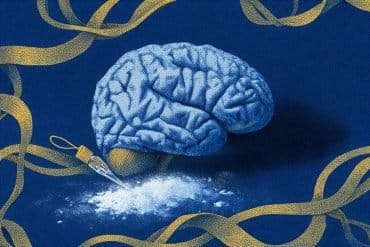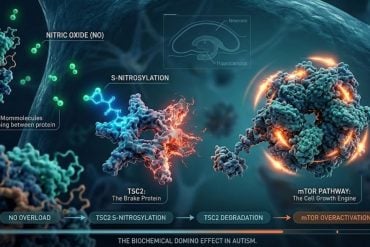Summary: Children who regularly help around the home with chores may perform better academically and have stronger problem-solving skills.
Source: La Trobe University
Requiring your kids to do chores on a regular basis may be associated with them having better academic performance and problem-solving skills, according to new research from La Trobe University.
The study, led by Ph.D. candidate Deanna Tepper and published in Australian Occupational Therapy, found that regular chores were associated with better executive functions—planning, self-regulation, switching between tasks and remembering instructions.
Tepper said the study’s results indicate that interventions that incorporate household chore-like activities such as cooking or gardening may be particularly beneficial for children.
“Parents may be able to use age and ability-appropriate chores to facilitate the development of executive functions,” Tepper said.
“Children who cook a family meal or weed the garden on a regular basis may be more likely to excel in other aspects of life—like schoolwork or problem-solving.”
The study looked at parents and guardians of 207 children aged between 5 and 13 years. In mid-2020, the parents/guardians were asked to complete questionnaires on the number of chores their children completed daily and their child’s executive function.
The researchers found that engagement in self-care chores, such as making themselves a meal, and family-care chores, for instance, making someone else a meal, significantly predicted working memory and inhibition (the ability to think before acting), after controlling for the influence of age, gender and presence or absence of a disability.
While previous research has shown that engaging children in age-appropriate chores can increase feelings of autonomy and is associated with improved prosocial behaviors and greater life satisfaction, this is the first study to look at the association between regular chores and child cognitive development, particularly executive functioning.
Executive functions are commonly defined as: working memory; the ability to monitor and manipulate temporary information; inhibition, the ability to inhibit automatic responses or suppress irrelevant information to focus on a task; and shifting, the ability to move focus between tasks.

“Typically, these skills begin to develop in early childhood and continue to develop into late adolescence and early adulthood,” Tepper said.
“Impairments or delays in executive functioning development can lead to difficulties in the ability to self-regulate, plan, and problem solve as adults, having implications later in life on reading performance and mathematical ability, as well as predicting overall academic achievement in later childhood.”
Early development of executive functioning has also been linked to engagement in tertiary education and improved physical health and better financial status in adulthood.
“Research indicates it may be possible to improve executive functions by developing individualized learning activities and routines,” Tepper said.
“We hypothesized that children who engaged in more household chores would have better inhibition and working memory. Our findings likely reflect that most chores require individuals to self-regulate, maintain attention, plan, and switch between tasks, thereby supporting the development of executive functioning.”
About this neurodevelopment research news
Author: Press Office
Source: La Trobe University
Contact: Press Office – La Trobe University
Image: The image is in the public domain
Original Research: Open access.
“Executive functions and household chores: Does engagement in chores predict children’s cognition?” by Deanna L. Tepper et al. Australian Occupational Therapy Journal
Abstract
Executive functions and household chores: Does engagement in chores predict children’s cognition?
Introduction
The benefits of completing household chores appear to transfer beyond managing day-to-day living. It is possible that chore engagement may improve executive functions, as engagement in chores require individuals to plan, self-regulate, switch between tasks, and remember instructions. To date, little research has been conducted on household chores and executive functions in children, for whom these skills are still developing.
Methods
Parents and guardians (N = 207) of children aged 5–13 years (M = 9.38, SD = 2.15) were asked to complete parent-report questionnaires on their child’s engagement in household chores and their child’s executive functioning.
Results
Results of the regression model indicated that engagement in self-care chores (e.g., making self a meal) and family-care chores (e.g., making someone else a meal) significantly predicted working memory and inhibition, after controlling for the influence of age, gender, and presence or absence of a disability. For families with a pet, there was no significant relationship between engagement in pet-care chores and executive function skills.
Conclusion
We strongly recommend that further research explore the relationship between chores and executive functions. It is possible that parents may be able to facilitate their child’s executive function development through encouraging participation in chores, whereas chore-based interventions (e.g., cooking programmes) may also be used to target deficits in ability.







